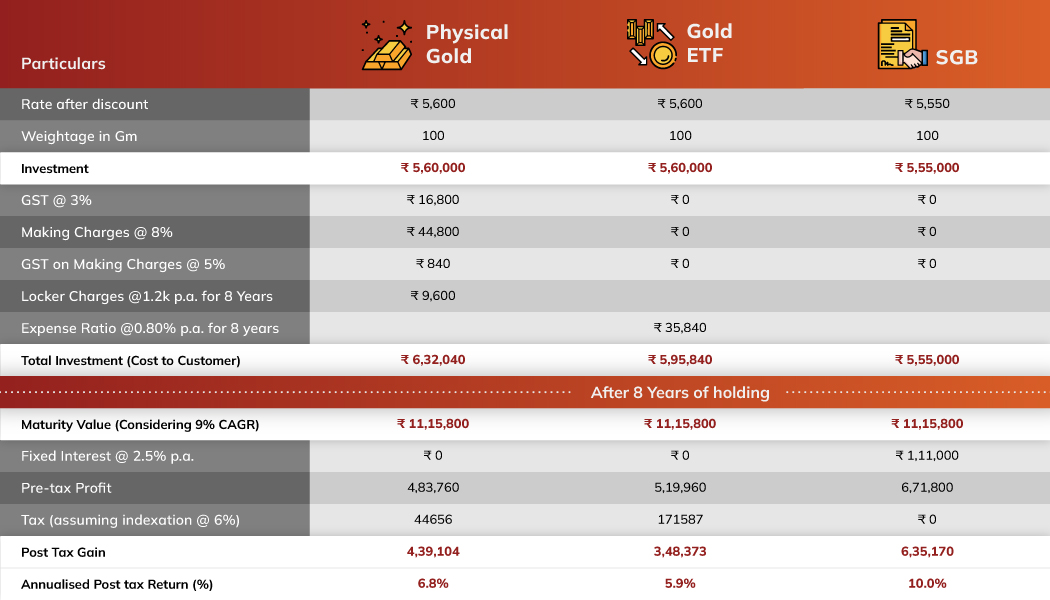Gold as a Safe Haven Investment: Why It's Worth Considering Now

Gold has always been considered a safe-haven asset, especially during times of economic and political uncertainty. In India, gold is not just a precious metal but is also deeply rooted in the country's culture and traditions. Moreover, after the COVID-19 pandemic and its impact on the global economy, many investors are turning towards gold as a means of diversifying their portfolios and hedging against inflation.
In addition, with the recent fluctuations in the stock markets and the depreciating value of the Indian rupee, gold has emerged as an attractive investment option for Indians. The government of India has also launched various gold schemes and initiatives – such as the Sovereign Gold Bond (SGB) Scheme and the Gold Monetisation Scheme – to encourage investment in gold and reduce the country's reliance on imported gold.
Overall, the current economic climate, coupled with the cultural significance of gold in India, makes this a good time to consider investing in gold.
When is the right time to buy gold?
The right time to buy gold depends on various factors, such as global and domestic economic conditions, geopolitical risks, interest rates, and currency movements. Here are some factors to consider:
Economic conditions: Apart from a downturn or recession, gold prices may also rise during times of high economic uncertainty or market volatility. For example, the COVID-19 pandemic led to a surge in demand for gold as a safe-haven asset.
Inflation: It is important to note that inflation alone may not be enough to drive gold prices higher. Other economic factors, such as interest rates and currency movements, also play a role in determining gold prices.
Currency movements: The relationship between gold prices and currency movements can be complex, and it is important to consider the interplay between different currencies. For example, a stronger currency makes it more expensive for investors holding that currency to buy gold, leading to a drop in both demand and prices. The converse scenario is also equally true.
Interest rates: In addition to interest rates, it is important to consider the "real" interest rates (interest rates adjusted for inflation) when evaluating the impact of interest rates on gold prices. During periods of negative real interest rates, gold prices may rise as investors seek to protect their wealth from inflation.
Geopolitical risks: Other geopolitical risks, such as trade tensions or natural disasters, can also impact gold prices. It is important to monitor global events and consider how they may influence the supply and demand dynamics of the gold market.
Market sentiment: Sentiment plays an important role in determining the price of gold. During periods of high optimism and confidence in the economy, the price of gold may decrease, as investors may prefer to take on more riskier investments. Conversely, during periods of fear and uncertainty, gold may be viewed as a safe-haven investment, driving up its price.
Seasonal demand: Demand for gold tends to increase during the wedding and festival seasons in India, such as during Diwali and Dussehra. This increased demand can drive up the price of gold during these periods, so it may be wise to purchase gold during periods of lower demand.
Government policies: The Indian government's policies related to gold can also impact its price. For example, changes in import duties or taxes on gold can affect its cost. Thus, it may be beneficial to stay informed of any changes to government policies related to gold before making a purchase.
Comparision of Physical Gold vs Gold ETF vs SGB

Conclusion
There is no one-size-fits-all answer to the question of when is the right time to buy gold in India. The decision to invest in gold should be based on careful consideration of various economic, geopolitical, and market factors that may impact the price of gold.
One thing to keep in mind is that gold should be viewed as a long-term investment rather than a short-term speculative play. It is important to have a diversified investment portfolio that includes a mix of asset classes, including stocks, bonds, real estate, and gold, among others.
Investors should also be aware of the tax implications associated with buying and selling gold, including capital gains tax and wealth tax, among others.
Ultimately, the decision to invest in gold should be based on your financial goals, risk appetite, and investment horizon. If you are looking for a safe-haven asset that can help preserve your wealth and provide a hedge against inflation and currency devaluation, gold may be a good option.
ICICI Securities Ltd. (I-Sec). Registered office of I-Sec is at ICICI Securities Ltd. - ICICI Venture House, Appasaheb Marathe Marg, Prabhadevi, Mumbai - 400 025, India, Tel No : 022 - 6807 7100. I-Sec is a Member of National Stock Exchange of India Ltd (Member Code :07730), BSE Ltd (Member Code :103) and Member of Multi Commodity Exchange of India Ltd. (Member Code: 56250) and having SEBI registration no. INZ000183631. Name of the Compliance officer (broking): Ms. Mamta Shetty, Contact number: 022-40701022, E-mail address: complianceofficer@icicisecurities.com. Investments in securities markets are subject to market risks, read all the related documents carefully before investing. The contents herein above shall not be considered as an invitation or persuasion to trade or invest. I-Sec and affiliates accept no liabilities for any loss or damage of any kind arising out of any actions taken in reliance thereon. Margin Trading is offered as subject to the provisions of SEBI Circular CIR/MRD/DP/54/2017 dated June 13, 2017 and the terms and conditions mentioned in rights and obligations statement issued by I-Sec. Such representations are not indicative of future results. The securities quoted are exemplary and are not recommendatory. The contents herein above are solely for informational purpose and may not be used or considered as an offer document or solicitation of offer to buy or sell or subscribe for securities or other financial instruments or any other product. Investors should consult their financial advisers whether the product is suitable for them before taking any decision. The contents herein mentioned are solely for informational and educational purpose.
 Top Mutual Funds
Top Mutual Funds








COMMENT (0)